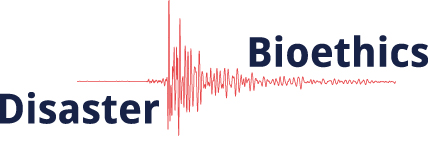Working Group 1: Healthcare ethics
Working Group Chair: Kadri Simm
Working Group Vice Chair: Johan von Schreeb
Full member list: Link (registered action members only)
Information about Working Group 1 (copied from MoU)
Healthcare needs are a priority in responding to disasters. However, medical, nursing and other healthcare professionals encounter significant ethical dilemmas. This WG will identify the significant ethical issues in providing disaster healthcare, engage in ethical reflection on those issues, and develop principles for ethics guidelines and other resources for healthcare professionals. Issues that require further ethical analysis include working in dangerous and vulnerable environments, approaches to triaging casualties, working outside one’s professional scope of practice, conflicts between different professionals, dealing with cultural differences in decision-making, and many others. For example, triage decisions should be based on needs, but this can lead to people of certain age, gender or disabilities being treated differently; another question is whether amputations be done for short-term benefit when long-term rehabilitation is unlikely to be available, severely impairing amputees’ quality of life and livelihoods; ethical issues in palliative care during disasters require consideration.
This WG will also carefully analyse approaches to ethical decision-making. Ethics training from high-income settings can create problems when applied in low-income or disaster settings. Healthcare professionals are confronted with having to make decisions when all options violate some ethical principle. This can be the source of moral distress, which adds another burden to responders which can become debilitating. This has led to the call for alternative approaches to ethical decision-making in ‘non-ideal’ situations (Tessman L. Hypatia 2010;25:797-824). This has much relevance for disasters, but requires extensive and careful analysis to develop practical approaches. WG1 will examine such non-ideal moral theories and their relevance for disaster bioethics, and develop theoretical approaches that are practically useful.
